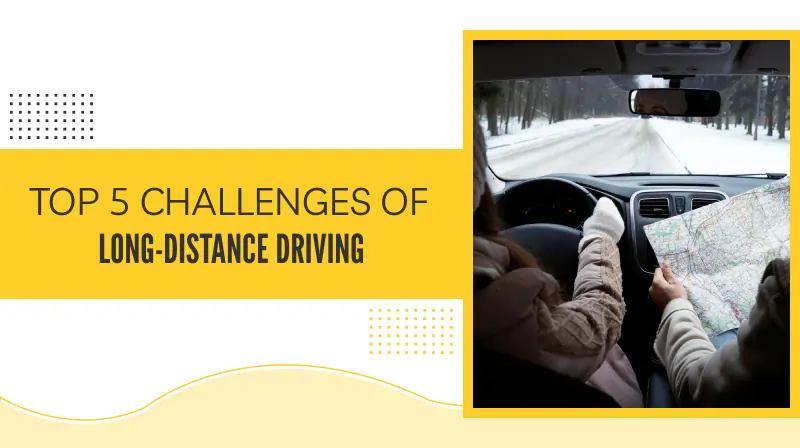Introduction
Long-distance driving is such an exciting experience that can be demanding at times. If you are going on a road trip, transferring to a new place, or driving on a trip to work, there are a number of unique challenges that come with extended hours on the road. Other than getting the car well prepared, these difficulties might put you in danger and make your journey unsuccessful.
In this article, we will walk you through common problems in long-distance driving and practical strategies to overcome them, ensuring your trip is no less than ideal and pleasant.
Fatigue and Drowsiness
Long-distance driving often leads to fatigue, reducing focus and reaction times. Drowsiness is one of the leading causes of road accidents , as it can result in microsleeps—brief moments of sleep that occur without warning.
How to Avoid:
- Take regular breaks: Stop every 2-3 hours to stretch, walk, and refresh.
- Sleep well before the trip: Ensure you’re well-rested before starting your journey.
- Stay hydrated: Drink water frequently, but avoid excessive caffeine to prevent jitters or dehydration.
- Consider professional help: Hiring a professional driver for long-distance trips can reduce fatigue and ensure safety.
Navigation and Getting Lost
Facing unfamiliar roads and having no enough information, navigation can be so tricky, particularly in the distant or countryside. Also, giving too much reliance on GPS devices might be a problem if you lose connectivity, which can also be the cause of the issues.
How to Avoid:
- Plan ahead: Map your route in advance and identify key landmarks.
- Use reliable navigation tools: Download offline maps through apps like Google Maps or Waze.
- Keep physical maps: Carrying a traditional map as a backup can be invaluable if technology fails.
Vehicle Breakdowns
Mechanical failures can occur unexpectedly, leaving you stranded, particularly in areas with limited access to repair shops. Issues with tires or fuel availability can exacerbate the situation. Make sure to have your vehicle maintenance before going for a long drive.
How to Avoid:
- Pre-trip inspection: Check your vehicle's tires, brakes, oil levels, and battery condition.
- Monitor fuel levels: Set up the fuel refilling beforehand, particularly for long trips when there are few gas stations.
- Carry essential tools: A spare tire, jack, and toolkit are must-haves.
- Emergency contacts: Make sure you keep the numbers for the roadside assistance services in your cell phone contacts list.
- Service your car: Regular maintenance before a long trip can prevent most breakdowns.
Road and Weather Conditions
Travelers may have to deal with unfamiliar roads and the lack of sufficient signage, which can further complicate the already complicated navigation task, especially when the area is far from urban centers.
How to Avoid:
- Monitor weather forecasts: Check updates for your travel route to anticipate weather-related issues.
- Drive cautiously: Reduce speed and maintain extra distance from other vehicles in bad weather.
- Equip your vehicle: Use all-weather tires and ensure headlights and wipers are in good condition.
- Adjust your route: If conditions are severe, consider rescheduling or rerouting.
Mental Stress and Monotony
Constantly driving for more extended time can make drivers feel bored, mentally fatigued, and stressed out. This, therefore, usually makes them easily irritated or poor decision-making during long-distance road trips.
How to Avoid:
- Stay entertained: Listen to music, audiobooks, or podcasts to engage your mind.
- Take mental breaks: Stop periodically to refresh and recharge.
- Switch drivers: Sharing driving responsibilities helps reduce stress and boredom.
- Hire a driver: Ultimate comfort can be obtained by hiring a professional long-distance driver who will not only get you there safely and comfortably while you take it easy.
Conclusion
The thought of long-distance travel often isn't pleasant but it surely doesn't have to be. Planning, ensuring the safety and comfort of your journey by identifying and tackling these typical challenges, such as fatigue, vehicle breakdowns, and planning fuel stops can be your best solution. Your ability to manage risk, prioritize good health, and take measures for safety are vital elements to overcome the barriers that are blocking your way on your long drives.
Do you need professional help for your upcoming road trip? A Driver on Hire company guarantees a comfortable and hassle-free trip by bringing in expert drivers. Call a driver in advance and go on your trip as stress-free as possible!
